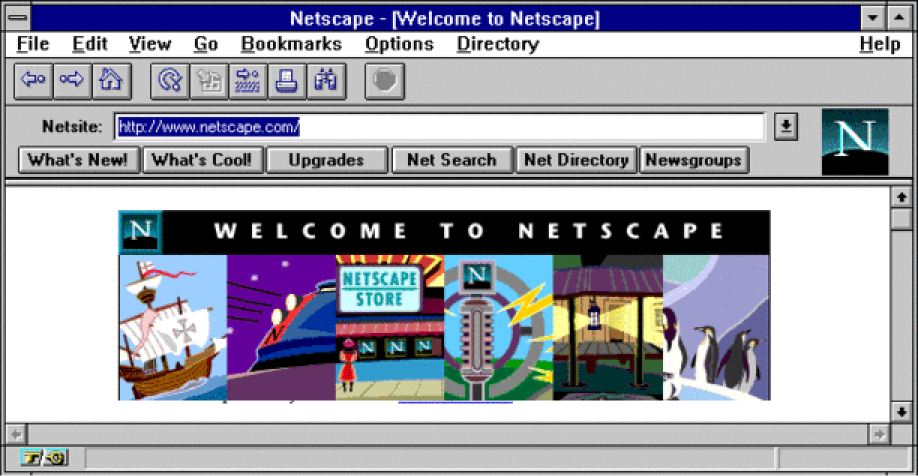
The Netscape-Microsoft Browser Wars: A Story of Unethical Tactics and Corporate Domination
The late 1990s were a turbulent time in the world of web browsers, with two dominant players fighting for control of the market. Netscape, the browser of choice for millions of internet users, was challenged by Microsoft, which created a similar browser and bundled it with Windows. The ensuing "browser wars" were marked by exclusive deals, shady marketing tactics, and a race to dominate the market. Here's how it all went down.
The Browser Wars
In August of 1995, days after Netscape’s debut as a publicly traded company, Microsoft launched Internet Explorer 1.0. Ironically, it was built on some of the same bones as Netscape Navigator. Netscape had over 80% market share.

Exclusive Deals and Shady Tactics
To gain an advantage in the browser market, Microsoft negotiated exclusive deals with computer manufacturers, such as Compaq, Dell, and IBM, to pre-install Internet Explorer on new computers. This made it harder for Netscape to compete, as most new computers came pre-installed with Internet Explorer. Microsoft also designed Windows to make it difficult for other browsers to work properly. For example, Internet Explorer was deeply integrated into the operating system, making it hard for users to uninstall or disable it. Furthermore, Microsoft did not provide developers with sufficient documentation on how to build applications that worked well with Windows, including web browsers. This made it more difficult for other browser developers to create products that worked well with the operating system and gave Internet Explorer a clear advantage.
The Shell Execute Bug
However, Microsoft's most significant tactic was the infamous "shell execute bug." This bug caused some users to fail when trying to install Netscape, but it was not present when installing Internet Explorer, giving Microsoft yet another advantage. While Microsoft claimed the bug was unintentional, many believed it was a deliberate attempt to prevent users from installing Netscape. The bug caused significant damage to Netscape's market share and cemented Microsoft's dominance in the browser market.
The Antitrust Case
The browser war of Microsoft vs. Netscape was nearing its end with predictable results when the government entered the fray. In 1998, the U.S. Department of Justice and the attorneys general of 20 states filed suit against Microsoft, alleging violation of antitrust laws.
Microsoft was accused of violating antitrust laws by bundling its software with its operating system, thus giving it an unfair edge over the competition. Netscape was at the center of the case.
Microsoft lost the case, but they won their key point on appeal: The company was not forced to split itself into two, separating its operating system business and its software business.

The Rise of Firefox
To counter Microsoft's dominance, some former Netscape employees founded the Mozilla Foundation, a nonprofit organization that developed the open-source browser Firefox. Firefox was faster, more secure, and more customizable than Internet Explorer. Its success can be attributed to its focus on user experience and design, as well as its open-source nature, which allowed developers to create extensions and other tools to improve the browser.
Other Players in the Browser Wars
While the Netscape-Microsoft browser wars were the most significant conflict in the history of web browsers, there were other players in the game. Opera, for instance, differentiated itself by focusing on speed and customization, and it pioneered features like tabbed browsing and browser extensions. Apple's Safari browser gained popularity due to its speed and integration with Apple's ecosystem, such as syncing bookmarks and settings across devices. Google Chrome, which was released in the late 2000s, quickly became the most widely used browser in the world, thanks to its speed, security, and minimalistic design.
“One of the phrases they were using is ‘freedom to innovate.’ And that resonates with a lot of people in the tech community. There’s a strong libertarian streak to Silicon Valley, and so that was kind of the master narrative that the Microsoft legal team was advancing.” —Andrew Chin, law clerk who assisted the judge in the Microsoft case
Conclusion
In conclusion, the Netscape-Microsoft browser wars were a sad tale of corporate domination and unethical tactics. Microsoft negotiated exclusive deals, designed Windows to give Internet Explorer an advantage, and even deployed the "shell execute bug" to prevent users from installing Netscape. Nevertheless, Netscape's story paved the way for better and more innovative browsers like Firefox and Chrome, which continue to improve the browsing experience for millions of users. As the browser wars continue to evolve, we can only hope that the focus remains on user experience, innovation, and fair competition.
If you want to know more about this story, there are 2 episodes in podcast Behind the bastards:
And as always, let me know what you think in the comment section.